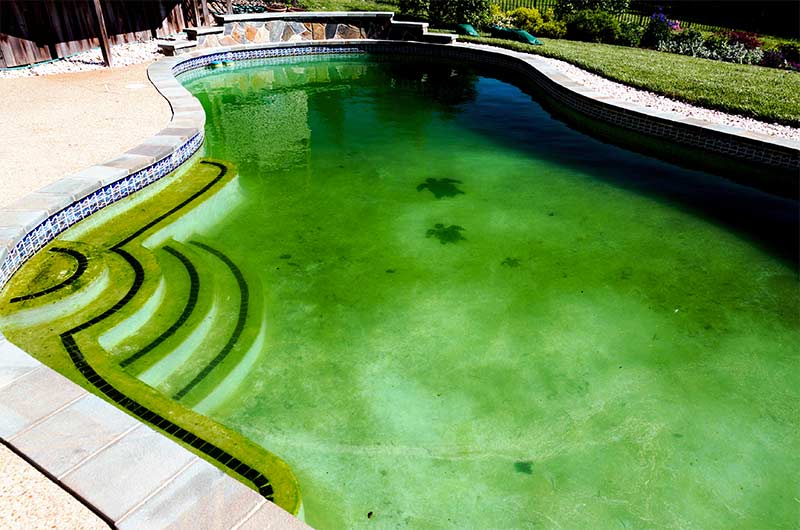Algae are microscopic plants that enter your pool by the way of rain, wind and when you fill your pool. If allowed to grow without treatment, the algae will grow and your water may quickly become unusable. Algae prevention and treatment is vital to effective and efficient pool care.
What Causes Algae To Grow?
Inadequate, Free, Available Chlorine Levels
Free, available chlorine levels in your pool can be depleted quickly by heavy rains, high temperatures and poor pool maintenance procedures. Test for Chlorine levels in your pool frequently during the warmer months in Osceola County. Add a sanitizer as needed, and consult with us if you have any questions. We test your pool water for free and do our best to educate you about proper pool maintenance.
High pH
Alkaline water prevents chlorine from effectively killing algae. Use a pH decreaser to remedy this issue. The correct ph level is 7.2 to 7.6., and we can show you how to get control over your pool’s PH level while we’re testing your water at our store in Kissimmee.
Brushing Your Pool Regularly
Dirt and slime buildup on your pool surfaces provides a perfect environment for algae to grow. Brushing and vacuuming really helps to maintain an unfriendly algae environment.
Typical Symptoms of Algae Growth
It’s typically pretty evident when you have algae growth in your pool. Cloudy or green water are a dead give away that algae is growing in your pool. Take steps to treat the problem before it gets too out of hand and makes your pool off limits to the family.
Types of Algae
Green Algae: The most common type of algae and also the most simple type to remove from your pool. Green algae are free-floating or surface-clinging and can turn a pool green in a matter of hours. In the summer months, adding new water to an under chlorinated pool to counteract evaporation can bring a quick blast of algae growth.
Black Algae: Black Algae typically grows on the rougher surfaces of the pool. It can look like thick, black, slippery spots on pool surfaces. It also forms a protective coating on the top making it more challenging to brush away. Black algae are typically found in gunite pools that are usually seen in Osceola County.
Mustard Algae: uMstard Algae appears as yellow or mustard spots on pool stairs, walls and floors. It often forms on the more shaded side of the pool and in areas off the pool with less circulation. It’s easy to brush off but difficult to eliminate. Mustard algae can often be resistant to chlorine and some compounds in regular algaecides, so a very specific algaecide is recommended to eliminate it. During your free pool water test art us of your yellow algae so we can prescribe the most effective and affordable method of treatment.
Treating Algae in Your Osceola County Pool
To remove algae from your pool you’re going to need to purchase the correct chemical, and then use them correctly.. Before using swimming pool chemicals, read all product labels for directions and safety precautions. We recommend you consult with us when you purchase pool chemicals. Chemicals can be dangerous and they can also cause harm to your pool. We will explain what chemicals to use and how to use them.
Proper regular maintenance of your pool is essential for healthy and clear water. Osceola Aquatics has been assisting our customers in Osceola County for decades because we are advocates for pool owners. We’re here to help you enjoy your pool for many years to come. We only recommend what you need and what will keep you and your family happy, safe and swimming!


Recent Comments